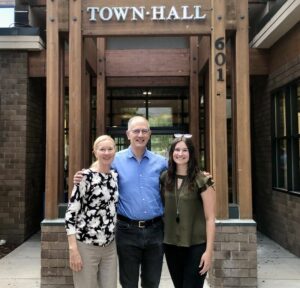By Jerry Tinianow
When a price drops, people buy more. You’ll learn that in the first week of any course in basic economics.
When government uses public money to drop a price, extra purchases are a predictable result. If government says those extra purchases prove success, however, some skepticism is warranted. That’s because the extra purchases are usually just a steppingstone to some other desired result. It’s the desired result that matters. “Success” is when that result happens.
Two recent government-engineered price drops illustrate this point. Last year the City of Denver offered free vouchers for discounts on eBikes. RTD reduced transit fares to zero for a month. One program lowered the price of eBikes and the other lowered the price of transit. The City and RTD said these programs were successes. To know whether they were, we need to identify the problem they were designed to address.
Each program had the same objective; to reduce air pollution and greenhouse gas (GHG) emissions. The assumption was that if drivers switched to eBikes or transit, it would help clean our air and stabilize our climate.
The eBike vouchers disappeared quickly. This isn’t surprising. EBikes are fun and trendy, but they are expensive. The vouchers lowered the price and opened up wallets, although nearly half had not yet been redeemed as of January 2023. Regardless of how many were taken and used, however, it’s important to remember that the objective of the voucher program was not to sell expensive bikes. It was to curb pollution in a cost-effective way. Did it?
Denver surveyed voucher recipients to find out. It claims that its eBike vouchers led to 100,000 fewer car miles per week. But statistics from the Census Bureau and the Downtown Denver Partnership show that the 100,000 car miles avoided were well under one percent of total car miles driven per week. Hardly enough to make the brown cloud disappear.
Statistics on the free fare program are similar. RTD said that its 100% fare cut last August raised ridership by 22% over July. But were the extra riders coming out of cars, or were they coming off bikes and sidewalks? Only the former cuts pollution.
RTD’s final report on the free fare month doesn’t say. An article published last April by Bloomberg columnist David Zipper, however, provides a clue. Zipper wrote that data from free fare programs elsewhere “suggests that making travel free enticed those who, due to limited income, would have otherwise walked, rode a bike or foregone the trip entirely.”
To be fair, the eBike vouchers and free fares did have value. They provided limited data on the impact such programs might have at scale. They also reduced some costs for low-income residents and promoted a more active lifestyle.
There’s no evidence, however, that these programs were cost-effective in reducing air pollution and GHG emissions. Yes, more people bought eBikes and took transit. If you give discount vouchers away, more people will buy eBikes. If you make transit free, more people will ride. We learned this in Econ 101. The issue, however, is whether the programs were cost-effective at solving the pollution problem.
They may have been, but we don’t yet know. We need more evaluation of how these programs affected air pollution and GHG emissions. How long did commuter use persist after the novelty wore off? How often did eBikes replace cars during the winter months? How many of the free fare riders gave up cars, as opposed to bikes and sidewalks?
These questions are important because public resources available to combat pollution are limited. When government money is used for vouchers and free fares, it’s not available for other programs.
We need to get the biggest bang for our public buck. Thus, we must consider whether the money used to drop prices would have been better spent elsewhere. Some have suggested, for example, that transit service frequency, reliability, speed and safety will get more people out of cars than reduced fares. Perhaps that’s where the money should be spent, instead of making fares free.
Free money makes people happy. Politicians get that. If that were the only goal of these programs, they were indeed “successes.”
But if the goal was to clean our air and protect our climate, we need a lot more information before declaring success.
Jerry Tinianow advises local governments on climate and sustainability programs through his company, WestUrb.com. He served as Denver’s chief sustainability officer from 2012 to 2019.


